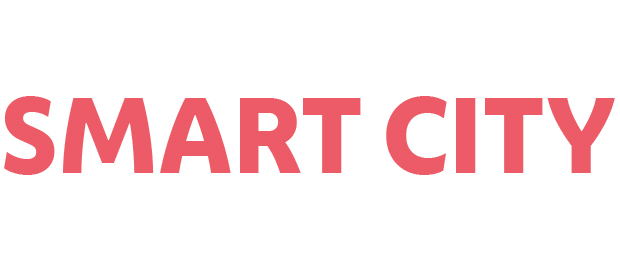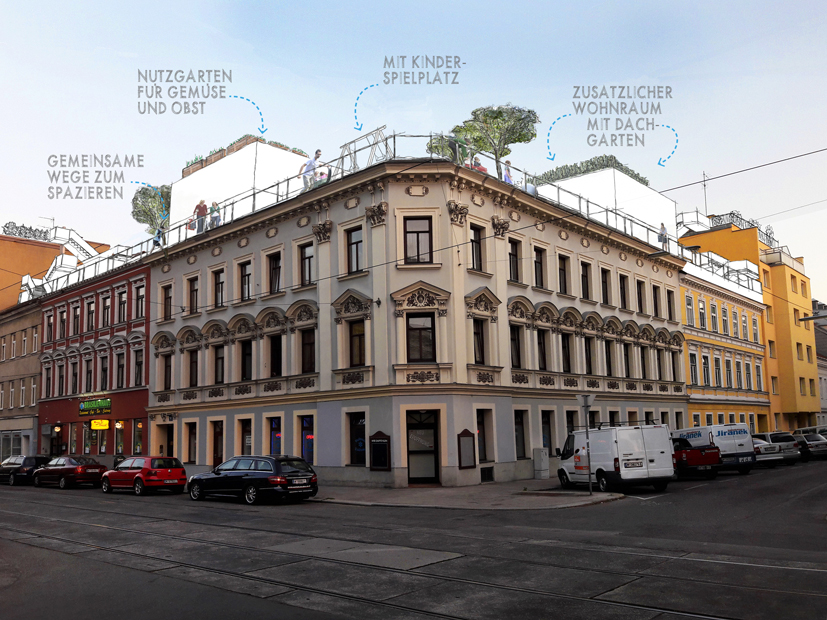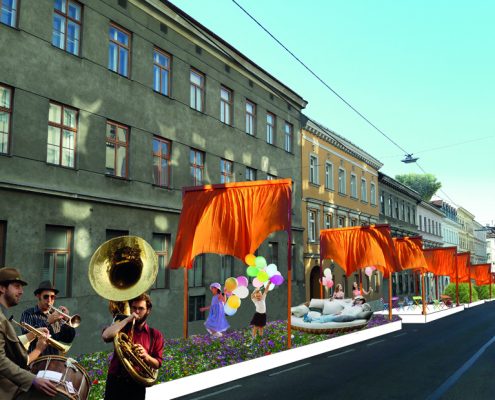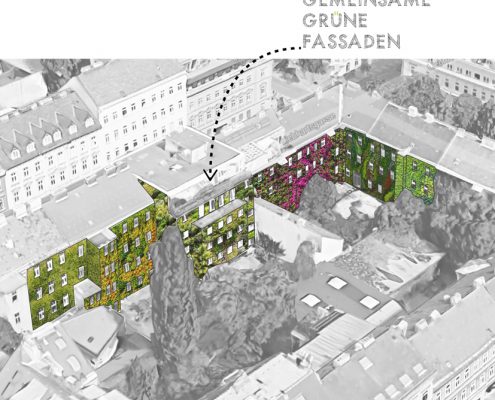Spaces and areas in the city are valuable: Sharing both with neighbours increases the quality of life. This is the central goal of the urban development strategy Pocket Mannerhatten.
Increasing pressure on areas and spaces in cities, increasing resource use, climate change-related problems (such as urban heat islands), social changes and new claims for use are challenging municipalities and residents, requiring innovative methods and strategies. With the concept Pocket Mannerhatten the approach of gentle urban renewal for existing city quarters should be extended in the sense of a sustainable urban development strategy / Smart City: According to the motto: “who shares, gets more” the valuable resources in the city are systematically shared across properties. In order to be able to integrate those owners who were previously difficult to implement, an innovative compensation system (“bonus system”) is being developed.
Sharing as an urban development strategy
The concept is based on the idea of systematically linking different building areas and functions across properties, thereby creating synergies. Different sharing options are available for this purpose, which can be combined according to the spatial conditions as well as the needs and wishes of the users and owners. For example, inner courtyards or roof areas can be combined into a larger one. Common areas can be tailored to the demands of its users and used by residents of multiple buildings. It is possible to jointly build new energy systems across buildings, thereby making it more profitable, and many other forms of sharing. These ideas for spatial sharing are combined with a compensation-oriented funding system and moderated participation processes to form an innovative urban renewal strategy.
From the idea to reality
The basic idea behind Pocket Mannerhatten came from architect Florian Niedworok, who developed the concept in 2012 as part of his diploma thesis (supervised by Prof. Bart Lootsma) at the University of Innsbruck. In 2014, the refined concept won the first prize of the Superscape Award in Vienna. In 2016 and 2017, a multidisciplinary consortium carried out an exploratory study on “Pocket Mannerhatten Ottakring” within the program “Smart Cities Demo” of the Climate and Energy Fund. In an interdisciplinary, participatory elaboration the team was able to precisely examine the framework conditions under which the spatial strategies of exchange and sharing can work. All relevant questions in regards to the sharing concept for the sustainable revitalization and densification of existing Gründerzeit quarters were worked out in this process. In addition, a pilot area and interested stakeholders who want to implement the strategy in a follow-up project could be found through this exploratory study.
Results of the exploratory study “Pocket Mannerhatten Ottakring” 2016/17
The in-depth investigation of the study took into account socio-scientific, architectural, urban planning, economic, energetic and legal aspects. The project’s outcome, a sophisticated concept for spatial sharing, has been documented in a comprehensive, generally understandable planning manual. It is available for download on www.pocketmannerhatten.at.
The central options of exchanging and sharing are:
Green Spaces: This option aims to merge courtyards or front yards into larger contiguous areas. Large-scale inter-property facade greening can also be realized within this option.
Mobility: With this option sustainable forms of mobility can be promoted. Multiple stakeholders can build a joint neighborhood garage or purchase and use a shared fleet of bicycles, cargo bikes, e-bikes and / or electric cars.
Energy systems: Under this option, energy and building services systems or related areas can be interlinked and thus used more efficiently. Building services elements, such as solar power systems, can be optimally positioned across properties. If systems are installed in a sufficient size, the participants can benefit from an increase in efficiency and economies of scale (= cost reductions).
Common rooms: With this option, access rights to specifically used common areas, e.g. gym, music room, etc. can be exchanged. This results in a greater variety and choice of uses and enlivens unused spaces.
Development: This option refers to the accessibility of existing buildings and passages through building areas. It allows users of several properties, e.g. to build a common staircase or elevator. This can result in more cost and resource efficient development.
Roof Surfaces: This option can be chosen to merge (walk-on) roof areas, and to thus make them usable e.g. as roof garden or movement area for multiple parties.
Built structures: The change in the built urban structure is a central aspect of urban development. For some changes, such as the deconstruction of buildings, a cross-property solution is useful. The option includes joint densification in the form of building extensions, loft conversions or yard compactions, also combined with the dismantling of densely built-up urban structure.
Ground floor zone and public space: In the Gründerzeit style city, ground floor zones are often too fragmented for a variety of commercial uses. The option can be used to bundle areas in small-scale city structures. Thus, larger, contiguous areas are created on the ground floor – the subsequent public space is included in the concept.
Temporary use and social aspects: This option is primarily about organizing collaborations that promote integration and solidarity. This can be the temporary use of vacancies, an apartment provided in solidarity for no additional costs or organized neighborhood assistance. This sharing option differs from the others in a sense that it does not include structural measures. However, the deliberate promotion of social interaction and participation are very important aspects of sustainable urban development.
Joker: The Joker is a flexible sharing option that allows you to take into account the uniqueness of each location and every actor, to put the various possibilities of sharing together as well as to integrate new ideas and sharing possibilities into the concept.
Compensation system with incentive impulse
Many urban development projects can only be implemented with the help of public subsidies. The strategy of Pocket Mannerhatten aims to develop a public-benefit oriented system with alternative, non-monetary funding opportunities. Thus, in the future public funding authorities should be financially relieved and further governance tools are to be created. The team’s deliberations include new forms of support, such as possible levy waivers, as well as considerations for selective exceptions in planning law and building regulations. The prerequisite for this is the condition that inter-property sharing triggers long-term public-benefit effects. The draft for the compensation system with incentive impulse (“bonus system”), developed in the exploratory study, has matured so far that it can be tested and evaluated in the follow-up project.
On site: planned implementation project
Parallel to the theoretical elaboration of the different aspects of sharing, the exploratory project involved an intensive process of activation and participation. In order to find a suitable area for the measures, an “area check” was developed and applied: The tool can be used to determine the specific sharing potential in neighborhoods and blocks. In areas where a particularly high sharing potential was identified, owners were contacted and invited to workshops and discussions.
Thus, a collaboration cluster, a city block in the district of Ottakring, was found, in which the team was able to prepare a detailed concept for the implementation in close cooperation with owners and planning authorities of the City of Vienna. The implementation plans meet all legal, economic, architectural, urban planning and social requirements, and are supported by the owners involved. The project was submitted and approved as an implementation project in the “Smart Cities Demo” program of the Climate and Energy Fund.
Idea and concept: Arch. DI Florian Niedworok
Project partners: tatwort Nachhaltige Projekte GmbH (project lead), Arch. DI Florian Niedworok – Studio Mannerhatten, TU Wien – Department für Raumplanung, TU Wien – Institut für Energiesysteme und Elektrische Antriebe, DDr. Gebhard Klötz
Contact
tatwort Nachhaltige Projekte GmbH
E-Mail: pocketmannerhatten@tatwort.at
Website: www.pocketmannerhatten.at
This post is also available in: German






